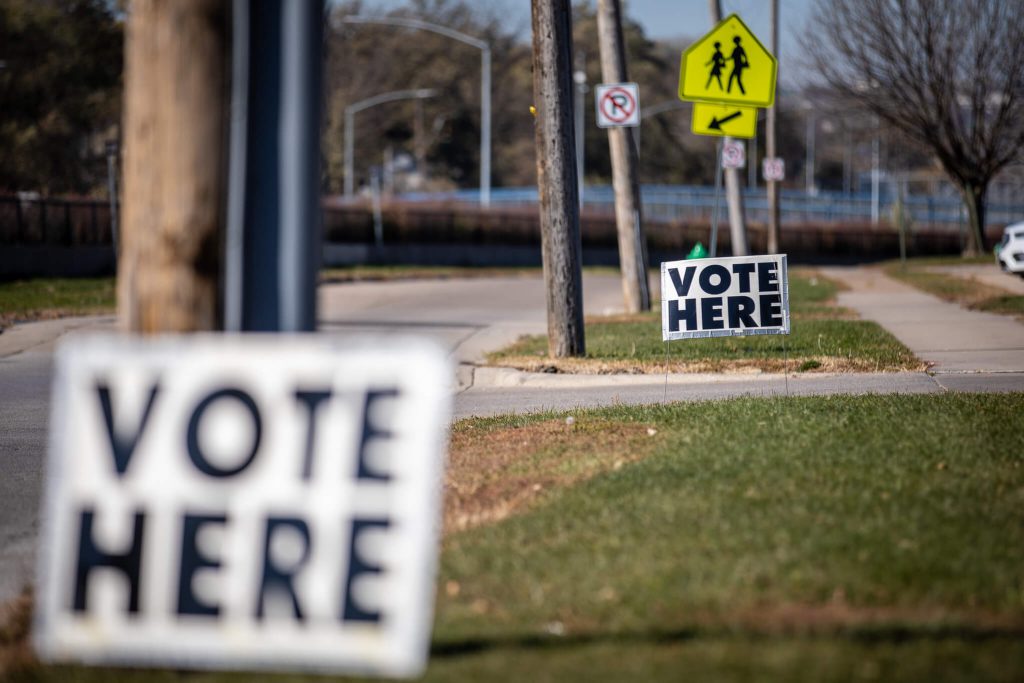Republicans Attack Zuckerberg Election Grants Again
Using emails from Green Bay's former clerk, GOP lawmakers are calling for an investigation.

Election Day 2020. Photo by Phil Roeder via Flickr (CC BY 2.0)
A Republican attorney who tried unsuccessfully to overturn the results of Wisconsin’s 2020 presidential election told GOP lawmakers Wednesday that newly released emails showed a group with ties to Facebook CEO Mark Zuckerberg had too much influence over the voting process in Green Bay last year.
While the latest development sparked calls for investigations from GOP lawmakers, Democrats accused Republicans of revisiting a debunked conspiracy theory by rehashing a failed court case involving an election they already lost.
In July, Wisconsin’s five largest cities — Milwaukee, Madison, Green Bay, Kenosha and Racine — announced they would share $6.3 million in CTCL grant funding to help run the election during the pandemic. CTCL said it awarded grants to a total of 221 counties, cities, towns and villages in Wisconsin as part of more than 2,500 election grants handed out nationwide.
Erick Kaardal, an attorney for the conservative Thomas More Society and a former secretary and treasurer for the Republican Party of Minnesota, filed two lawsuits challenging the grants on behalf of a group called the Wisconsin Voters Alliance. Kaardal lost both cases, one in state court and one in federal court. He also filed and lost similar lawsuits in other swing states.
The Wisconsin grants received renewed attention this week when emails uncovered through an open records request showed former Green Bay municipal Clerk Kris Teske raised issues with the funding, suggesting that a private contractor hired by the city was making decisions that should be her responsibility.
“I don’t understand how people who don’t have knowledge of the process can tell us how to manage the election,” Teske wrote in one email.
The emails were published by Wisconsin Spotlight, a website run by the conservative organization Empower Wisconsin, whose president is former Republican state Rep. Adam Jarchow and whose director is Eric O’Keefe, a longtime Republican operative.
GOP lawmakers seized on the news, holding an invitation-only hearing of the Assembly Committee on Campaigns and Elections where Kaardal was the featured speaker.
“We don’t want it to become routine,” Kaardal said of the CTCL funding. “We don’t want every city to allow private corporations to come in and influence the election administration process.”
Democrats on the committee issued a written statement afterward calling the meeting the latest GOP attempt to undermine the 2020 election.
“Not a single piece of information he discussed today pointed to any impact to a single vote, and Mr. Kaardal’s track record around the 2020 election is so unreliable that a federal judge has referred Mr. Kaardal for disciplinary action,” the Democratic lawmakers said.
In addition to Kaardal’s lawsuits on behalf of the Wisconsin Voters Alliance, he also represented rapper Kanye West in West’s unsuccessful bid to get on Wisconsin’s presidential ballot.
Democrats also attacked Republicans for not inviting Green Bay Mayor Eric Genrich to testify. Genrich’s office told the Associated Press on Tuesday that city attorneys had reviewed Republican claims and found them to be “completely without merit.”
Republicans also did not invite testimony from any staff at the Wisconsin Elections Commission an agency spokesperson confirmed Wednesday.
In addition to Kaardal, former Brown County Clerk Sandy Juno, a Republican, testified that she thought the mayor’s office was too involved in election decisions that should have fallen to the municipal clerk in November 2020.
“In all the years that I worked with elections, I’ve never seen anything like this,” said Juno, who retired after the November election.
While emails published this week show obvious tension between the mayor’s office and Teske — who has since left her old job to become Ashwaubenon’s municipal clerk — some of the claims made by Republicans about Zuckerberg’s group are far more tenuous.
A key figure in those claims is Michael Spitzer-Rubenstein, the Wisconsin state lead for the nonprofit National Vote at Home Institute who was working for the city of Green Bay on the election last year. Spitzer-Rubenstein has worked on a variety of Democratic political campaigns in New York.
Emails show Spitzer-Rubenstein offered to help Teske “cure” missing witness information on absentee ballots, a process expressly allowed in Wisconsin for the past two presidential elections.
Another document showed Spitzer-Rubenstein was granted access to the room where absentee ballots were to be counted in Green Bay. But in an email to WPR Wednesday, Green Bay city attorney Vanessa Chavez said that was only because Spitzer-Rubenstein was the person who initially secured the room.
“However, City staff were the ones who actually handled everything,” Chavez said.
Chavez said absentee ballots were never stored at the KI Convention Center, where they were eventually counted on Election Day.
“They were stored at City Hall and moved to KI on Election Day by City staff,” Chavez wrote.
The complaints lodged by Kaardal and other Republicans did not cite any instances of fraud or examples where specific votes had been altered.
Kaardal’s lawsuit seeking to block the CTCL funding for Wisconsin was rejected in October by U.S. District Judge William Griesbach, who was nominated to the federal bench by former Republican President George W. Bush. When Kaardal appealed to the Seventh Circuit Court of Appeals, Judges Diane Sykes, Joel Flaum and Frank Easterbrook — all Republican nominees — denied the case. U.S. Supreme Court Justice Brett Kavanaugh, who was nominated by President Donald Trump, denied Kaardal’s Supreme Court appeal.
“This petition does not merit further consideration by this court, much less grant us a license to invalidate every single vote cast in Wisconsin’s 2020 presidential election,” Hagedorn wrote in his December ruling.
Republicans proposed a package of election bills last month that include limits on private election grants to cities. One of the proposals would require those grants to be approved by the Legislature’s budget committee and be distributed evenly throughout the state based on population.
GOP lawmakers also seized on the latest findings to call for an investigation of what happened in Green Bay. The co-chairs of the Legislature’s audit committee announced Wednesday that they had forwarded the information about Green Bay to Wisconsin’s nonpartisan auditor general, who is already conducting a review of the 2020 election.
On Tuesday, three Republicans called for Genrich’s resignation. Genrich did not respond to a question about calls for his resignation.
Republicans Renew Attack On Election Grants Funded By Facebook’s Mark Zuckerberg was originally published by Wisconsin Public Radio.
More about the 2020 General Election
- Senator Agard Statement on Senator Knodl’s Continued Relitigation of the 2020 Presidential Election - Dane County Executive Melissa Agard - Aug 29th, 2023
- Report Calls For Criminally Charging State’s Fake Electors - Henry Redman - Dec 19th, 2022
- Vos Withdraws Subpoenas, Ends Gableman Probe - Henry Redman - Aug 30th, 2022
- Judge Blasts Gableman Probe, Deleted Records - Henry Redman - Aug 17th, 2022
- Vos Fires Gableman, Ends Election Probe - Shawn Johnson - Aug 14th, 2022
- Judge Orders Gableman To Pay $163,000 In Legal Fees - Rich Kremer - Aug 2nd, 2022
- Prosecute 2020 Fake Electors, Advocates Demand - Erik Gunn - Aug 1st, 2022
- Trump Calls For Nullification of Wisconsin’s 2020 Election - Henry Redman - Jul 12th, 2022
- Legal Fight Over Gableman Probe Keeps Growing - Shawn Johnson - Jun 30th, 2022
- Back In the News: Fake Elector Scheme Dogs Ron Johnson - Bruce Murphy - Jun 28th, 2022
Read more about 2020 General Election here



















